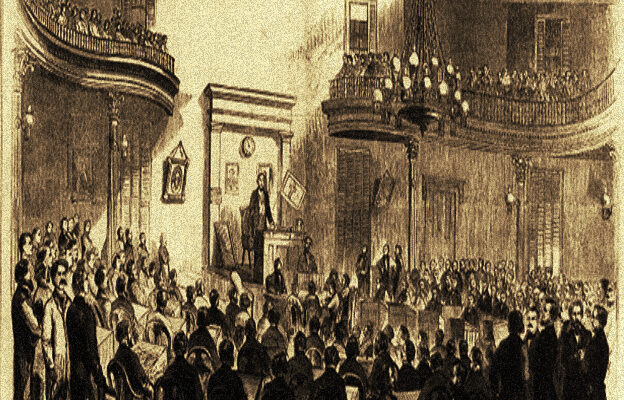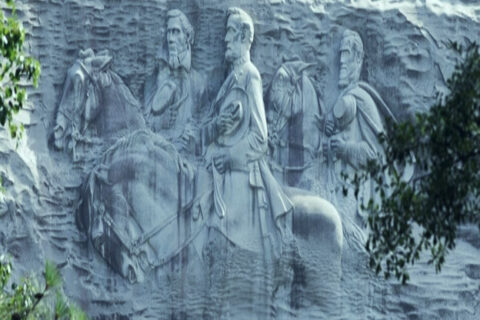On February 1st, 1861, the Texas Secession Convention met in Austin and voted 166-7 in favor of leaving the Union. Just over three weeks later, on Feb. 24th, the good people and voters of the Lone Star State approved their late convention’s decision by a three-to-one margin, thus securing Texas’ place as the seventh in the order of States to secede.
Meanwhile, the provisional Confederate Congress met in Montgomery, Alabama, on the fourth day of the month, and organized the Confederate States of America (CSA). Four days later (Feb. 8th), the provisional Constitution for the CSA was unanimously adopted by that body at the same place. Jefferson Davis and Alexander Stevens were elected President and Vice-President of the CSA one day later, on Feb. 9th, just two days prior to the latter’s 49th birthday (11th). Although Mr. Davis’s election occurred on the 9th, the inauguration of the new president would be delayed until the 18th day of the month. Three days later (21st), Floridian Stephen R. Mallory was appointed Secretary of the virtually non-existent and never fully functional Confederate Navy.
Although there is no entry marking the event on my 1995 edition of the Confederate Calendar, the first day of the current month marks the 1873 death of one of America’s greatest benefactors, Matthew Fontaine Maury, known to history as the “Father of Oceanography” and Pathfinder of the Seas. It will likely come as news to many of you that then Captain Maury most assuredly received notification of Mallory’s appointment to the position of CSA Navy Secretary with a good deal of well-placed anxiety. Word of the appointment likely came to Maury via telegraph at the offices of the National Observatory in Washington D.C., where he continued to faithfully execute his duties as superintendent of that institution in lieu of further instructions from Governor Letcher across the Potomac in Richmond.
Maury’s biographer-daughter, Diana Fontaine Corbin, devoted the entirety of Chapter VIII of her book, A Life of Matthew Fontaine Maury, to what she describes in the chapter’s opening sentence as “the most painful and mortifying episode in [Maury’s] career.” Specific contents of the chapter combine to serve as ample explanation of the source of her father’s apprehension towards Mallory’s appointment mentioned above. As Mrs. Corbin later reveals, the “episode” of which she speaks was the infamous decision of the Navy Retiring Board to place one of the most eminent and world-renown men on this continent on their retired list of officers who were, without prior notice and without explanation, deemed unfit by the Board to fulfill their duties as naval officers. Maury was notified of his involuntary retirement by the then Secretary of the Navy, J.C. Dobbin, who wrote to Maury concerning the matter as follows (dated September 17th, 1855):
The Board of Naval Officers assembled under the Act to promote the efficiency of the Navy, approved Feb. 28th, 1855, having reported you as one of the officers who in their judgment should be placed on the Retired List on leave of absence pay, and the finding of the Board having been approved by the President, it becomes my duty to inform you that from this date you are removed from the Active Service List and placed on the Retired List on leave of absence pay. You are, however, not detached from the Naval Observatory. I avail myself of the authority of the law to direct that you continue on your present duty.
Although not a member of the “Retiring Board” in question, Stephen Mallory was nevertheless a powerful U.S. Senator and Chairman of that body’s Naval Affairs Committee at the time of these goings-on. Mrs. Corbin further writes in this connection that:
Senators Davis and Mallory, prominent advocates of the original Bill establishing the Retiring Board, both strongly opposed Maury’s reinstatement when a Bill praying for justice for those injured by the action of that Board was introduced into Congress. One afterwards became President of the Confederate States, and the other his Secretary of the Navy, and, both before and during the war, were inimical to Maury.
When word got out of Maury’s retirement by the Board, influential newspapers began to demand his immediate reinstatement to active service and promotion to the rank of Captain. However, these demands by the press and the general American public were not met until three years later (1858), and a primary reason for the delay was that Stephen Mallory (in combination with Jefferson Davis and others) used his position in the Senate and his chairmanship of the Naval Affairs Committee aforementioned to stifle and prevent both Maury’s reinstatement to active service and his promotion. Mrs. Corbin writes of this that “although restitution was made, and he was restored to the service and promoted by special Act of Congress, yet the iron entered into his soul.”
The Confederate “Gunboat Wars” that later ensued between Commander Maury, President Davis and Secretary Mallory were the ‘nail in the coffin’ so to speak, proving that Maury’s apprehensions upon his old nemesis, Stephen Mallory’s, appointment as Secretary of the Confederate Navy had not been misplaced. Two unpublished chapters in my book about Maury’s “Life and Times” combine to tell the story of these incidents in fuller detail. A “Civil War historian” named John Grady wrote and published an article in 2012 that tells the story of these incidents in less detail, but that is nonetheless factual and worthwhile reading. For those of you interested in Mr. Grady’s 2012 article just mentioned, it may be found here.
In closing this current edition of This Month in Confederate History, a few words will be devoted to the first receipt of federal prisoners at Andersonville prison camp, 27 February, 1864. At that early date, the walls of the prison yard had not yet been completed, therefore special measures were necessarily taken to ensure its inmates would not attempt escape. For a full and fair firsthand treatment of the subject of Andersonville and the horrible conditions that overcrowding and undernourishment would ultimately combine to heap upon its unfortunate prisoners, read Andersonville inmate James Madison Page’s 1908 book titled, The True Story of Andersonville Prison, A Defense of Major Henry Wirz.
As always many more events connected to This Month in Confederate History could be recited and discussed to greater or lesser extent. It is nevertheless hoped that those few events discussed are satisfactorily and well-received by the reader.
God bless you all, and may God bless and free the Southland!







This sharp prejudice and ill-use of Maury by Mallory and Davis is news to me! Can you hint at WHY they were so bent on keeping down and out of the way one of the most qualified of men in naval affairs?
German Confederate,
Sorry for the delay in responding. My answer to your question is admittedly one-sided, and therefore, I fear, inadequate. With respect to Mallory and his faction, Maury chalked it up to what we might call pofessional jealousy; as concerns Jefferson Davis, I take it he never really understood how vital it was to have an effective navy, and was therefore mostly indifferent to it. Mallory understood the need for an effective navy, but during the WBTS his idea was to try to match the federal navy ton-for-ton, which Maury knew was an impossibility from the very beginning. Mallory rightly saw Maury as the chief impediment to his plan, and therefore kept looking for ways to get him out of the country and out of his way. Once Lieutenant Davidson was sufficiently trained (by Maury) in “submarine warfare,” it was just a matter of ordering Maury to Europe on a “diplomatic” mission. Here is an excerpt from a Maury letter to his lifelong friend, Bishop Otey, concerning the “professional jealousy” amongst Maury’s Navy peers (including Mallory) I mentioned above:
Thanks for the question/comment.
Very unworthy of a confederate … though one would expect it of a Yankee. No doubt politics corrupted him (i.e. Mallory).
“A sound heart is the life of the flesh, but envy is the rottenness of the bones.” (Prov. 14:30).
I appreciate the explanation.